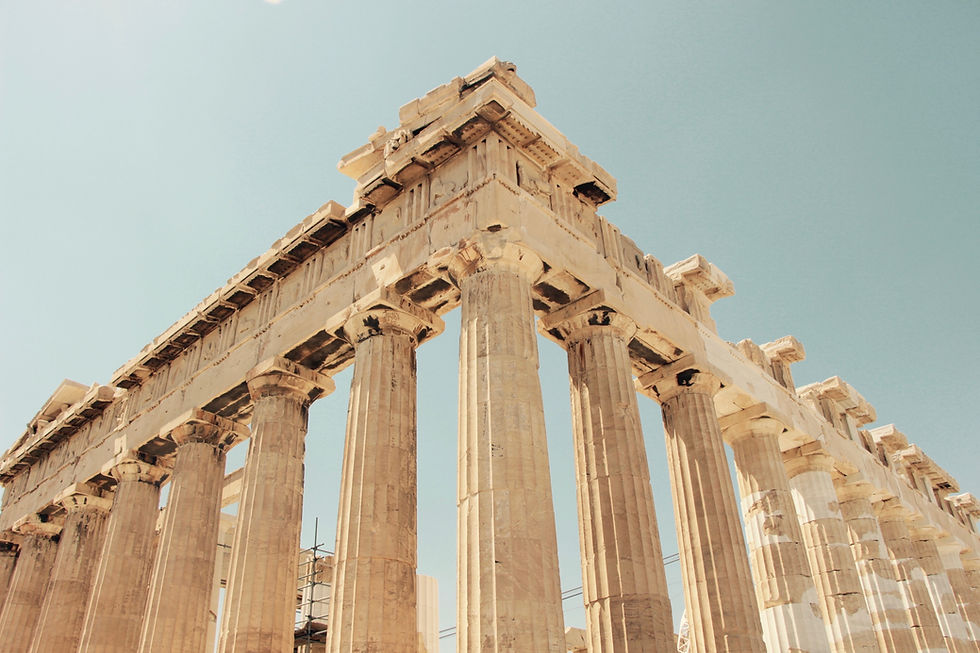A Very Quick and Quite Silly History of Atheism
- Courtney Heard

- Dec 4, 2023
- 6 min read
Updated: Jan 25, 2024
Which came first, the gods or the lack of belief? Just how far does atheism go back? There's really no way to know which human in history was the first to live without belief in deities, but that's not going to stop us from glancing back at atheism throughout human history. It all started back with the Flintstones.
1. The Ancient "Wait, What Are Gods?" Era
Back in the really old days (and I mean, 'writing on cave walls was the new Twitter' old), humans were just figuring out fire and the wheel. Amidst all this, a few brave souls were probably too busy surviving to even think about deities. Atheism here wasn't a philosophy; it was more like, "I'm too busy running from saber-toothed tigers to ponder the existential."
2. The Greek "Too Cool for Zeus" Period
Fast forward a few millennia to Ancient Greece, where philosophers were basically the rock stars of their time. Some of these deep thinkers, like Epicurus, began to question the whole godly soap opera in the skies. They didn't openly declare, "There is no Zeus," but they were definitely thinking, "Zeus who?" while sipping on their ancient espressos.

Epicurus was all about maximizing pleasure and minimizing pain, but not in a wild, hedonistic way. More like, “Enjoy your bread and cheese, but don't stress about Zeus zapping you for not sacrificing enough lambs.” He subtly nudged people towards the idea that maybe, just maybe, the gods weren’t micromanaging human affairs. It was revolutionary, really. Like suggesting to a room full of die-hard Jordan Peterson fans that maybe their hero is full of shit.
So, in a way, Epicurus laid the groundwork for future skeptics and non-believers, all while chilling in his garden, probably wondering why everyone else was so uptight about the gods.
3. The Early Middle Ages "Shh, Don't Tell the Church" Phase
The Early Middle Ages was a period better known for its "ye olde plagues" and less "ye olde hygiene," wasn't exactly a golden era for freethinkers, especially in the Christian world. Atheism in the Early Middle Ages was more of a rumor you might spread about your annoying neighbour or your sworn enemy than a thing that was ever uttered seriously. If you even whispered, "I'm not sure about this whole God thing," you'd find yourself on a fast track to the nearest inquisition.
So, closeted non-believers would have had to play it cool, like a progressive stumbling onto a Trump rally on their way home from the picket line. There may have been a few infidels thinking, "Do I really believe in a giant man in the sky controlling my destiny? I don't know. Should I stop thinking this? Absolutely. I hear being hung, drawn and quartered isn't exactly Netflix and chill. "
Ergo, sweet heretics, stealth atheism was all the rage in those days.
4. The Renaissance "Reason Over Revelation" Revolution
The Renaissance brought a refreshing shower of reason, washing away some of the medieval grime. People started to value science and evidence over blind faith. The Renaissance was a time when art flourished and people started questioning whether the Earth was the center of the universe or just a middling planet in the cosmic dance.
In this era of rebirth and rediscovery, folks began dusting off those old Greek and Roman texts and found guys like Epicurus asking, "Are we sure about this whole pantheon thing?" This sparked a lightbulb moment – well, more like a candle flicker, given the times – in some Renaissance brains.
Sure, no one was shouting "I'm an atheist!" from the rooftops (unless they wanted a one-way ticket to Iron Maiden, and I don't mean the band). But there was a definite shift from "The Earth is the center of everything because the church says so" to "Hmm, what's this Copernicus fellow on about?" People started to embrace science and humanism, and while they weren't rejecting religion outright, they were definitely giving it some serious side-eye. The Renaissance was like atheism sneaking out of the house to go to a science party – risky, exciting, but not quite ready to make the big break. This wasn't full-blown atheism yet, more like, "Let's not burn people at the stake for questioning things."
5. The Enlightenment "God? Which One?" Era
The Enlightenment was the ultimate glow-up for humanity. Philosophers like David Hume and Immanuel Kant started throwing major shade at organized religion. The general vibe was less "There is no god" and more "Let's just all use our brains, okay?" This was the time when atheism decided to come out of its philosophical closet and say, “You know what? Maybe everything isn’t controlled by an invisible man in the sky.”
Enter the Enlightenment thinkers, the intellectual rockstars who were like the Beatles of rational thought. They started throwing around wild ideas like freedom of thought, empirical evidence, and – hold onto your powdered wigs – questioning the church. It was less “Let’s burn it all down” and more “Let’s light the candle of reason, but, like, respectfully.”
Voltaire, Diderot, and their merry band of skeptics didn’t outright declare, “God is so last season,” but they were definitely flirting with the idea. They were like, “Look, we’re not saying there’s no God, but let’s focus on this cool new thing called science.”
The Enlightenment was the age of reason, where logic was the new deity, and questioning everything was in vogue. Atheism was still the talk of the town in hushed whispers, of course. Openly admitting to it was still a social faux pas, like posting your Nickelback shirt on main. But the seeds of skepticism were sown, and oh boy, did they start to sprout. It was the dawn of a new era where reason started to wear the crown, and atheism slowly began to get its groove on.
6. The 19th Century "God is Dead" Movement
Welcome to the 19th century, where atheism finally put on its big kid pants and started to make some noise. This was the time when atheism went from being the quiet kid in the philosophical classroom to the one organizing underground debate clubs.

First up, we've got our boy Charles Darwin, who casually dropped "On the Origin of Species" and had everyone rethinking their life choices. He was like, “Evolution, ever heard of it?” and suddenly, the Church had more to worry about than just keeping the pews warm.
Then came the philosophers who didn't just push the envelope – they set it on fire. Nietzsche declared, "God is dead," and everyone lost their collective minds. It was less of a funeral announcement and more like, “Hey, we might not need the big guy upstairs to figure out this whole life thing.”
Atheism in the 19th century was like a teenager rebelling against their strict religious parents. It wasn’t about being godless heathens; it was a quest for meaning in a rapidly industrializing world. Atheists were the punk rockers of their time – a bit misunderstood, slightly confrontational, but undeniably influential.
So, in a century where top hats were the height of fashion and the steam engine was the hottest new tech, atheism found its voice. It wasn’t always loud or clear, but it was getting ready to take the stage in the upcoming century, and spoiler alert: it had a lot to say.
7. The 20th Century "Atheism Goes Mainstream" Boom
Enter the existentialists, like Jean-Paul Sartre and Albert Camus, who made staring into the abyss of a godless universe seem not just cool, but downright chic. They were chain-smoking in Parisian cafes, sipping espresso, and musing, “Life is absurd, God is MIA, let’s write some angsty literature about it.”
Then, along came the space race and the Cold War. Humanity was too busy racing to the moon and building nukes to bother much with divine intervention.
In the pop culture arena, atheism was the new underground indie band that everyone secretly listened to but wouldn’t admit at polite dinner parties. It was edgy, it was provocative, and it was slowly but surely gaining followers.
It would seem like theism trickled into the mainstream. From Bertrand Russell's teapot to Richard Dawkins’ "The God Delusion," atheism was suddenly accessible. It wasn't quite as taboo to question, it might have even been a little chic to doubt, and secularism was hot. Atheists had conventions, wrote books, and even had their own merch. Ahem.
So, in a century that gave us jazz, rock ‘n’ roll, and the internet, atheism became part of the mainstream ensemble. It wasn’t just questioning God; it was questioning everything – authority, society, and why we let Vanilla Ice into our lives. The 20th century was where atheism got its groove, and oh boy, did it dance to its own existential beat.
8. The 21st Century "Just Another Belief" Normalization
Today, atheists still face oppression and discrimination in many parts of the world, but it's become quite common on the internet. You've got your atheist YouTubers, podcasts, and even atheist TikTok influencers. It's no longer about just rejecting religion; it's about building a community around our shared appreciation of skepticism and science.
So, there you have it, folks: a silly, questionably accurate, but hopefully entertaining history of atheism. From ancient skepticism to modern-day non-belief, atheism has had quite the journey. It's gone from being a silent thought in the back of a cave dweller's mind to a full-fledged movement with all the digital trappings of the 21st century.
Remember, whether you're a strong atheist, a questioning agnostic, or a faithful believer, the most important thing is to keep questioning, keep pondering, and, most importantly, keep a good sense of humor about it all. After all, if you can't laugh at the cosmic absurdity of existence, what can you laugh at?







































Nice read, thanks for sharing!
A concise and playful piece like A Very Quick and Quite Silly History of Atheism is always fun to see — especially when it takes a topic and presents it in a light, engaging way without overcomplicating things. Articles like this feel way more enjoyable than most generic content floating around. I like how the author keeps the tone simple yet thoughtful. Alongside fun explorations like this, it can also be interesting to explore health and treatment resources like https://ways2well.com/blog/what-to-expect-the-price-of-hormone-replacement-therapy-explained when you’re browsing different topics — not for the name, but because they pop up in unexpected contexts and stick in your mind.
Overall, a solid and entertaining read. Perfect for anyone curious about ideas…
A tiny point, but strictly speaking, atheism isn't just another belief . Strictly speaking atheism is the lack of a belief. and unfortunately, in some places in the world, stating that lack of belief can be worth your life.